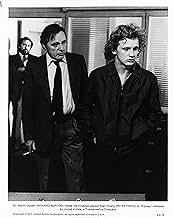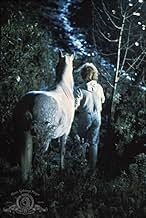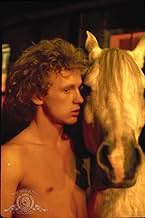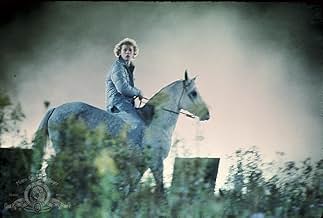Ajouter une intrigue dans votre langueA psychiatrist attempts to uncover a troubled stable boy's disturbing obsession with horses.A psychiatrist attempts to uncover a troubled stable boy's disturbing obsession with horses.A psychiatrist attempts to uncover a troubled stable boy's disturbing obsession with horses.
- Nommé pour 3 Oscars
- 5 victoires et 7 nominations au total
- 2nd Child
- (non crédité)
- Dr. Bennett
- (non crédité)
- Mr. Davies
- (non crédité)
- Ringmaster
- (non crédité)
- Mary
- (non crédité)
Avis à la une
Sidney Lumet adds this version of Peter Schaffer's play to his list of memorable theatrical adaptations while Richard Burton earns his reputation breaching the third wall to provide the glue that holds the film together and was duly rewarded with several awards (including an Oscar nomination).
The orange-tinted scene in the barn where Jenny Agutter slips out of her jodhpurs and on to her back provides an unexpected thrill unfortunately blighted (SPOILER COMING:) by the truly shocking sight that immediately follows.
Richard Burton delivers hypnotic sermons, staring straight into the camera, as we slowly zoom in on his face. He confesses that he's jealous of his patient. The boy is in pain, but passion is pain. The boy is worshiping a pagan god -- something Burton wishes he could do as well. Instead, he settles for flipping through books, looking at photographs of old artifacts. The therapist wonders if he's taking the boy's god away by curing him.
If you like Carl Jung, you'll love this film! Equus, archetypal God, we love you!
Some complain that the psychology in this film is "campy" at best. Others say the film can't possibly compare to the stage play. Well, fine. Maybe it shouldn't be used as a model for treating patients, and maybe plays are different than movies. But the film as a piece of art, on its own, is powerful, moving, and fascinating.
And it is here where Lumet's genius comes in. If there is one thing that Lumet has a feel for, it is the gritty, down-to-earth feel of everyday life. While this usually means New York life, he does a marvelous job in this film of capturing the drab sterility of Dysart's world, as well as that of the Strang home. When these are compared to the vivid, almost ethereal shots of Alan in the stables or with the horses on the field (also, compare the striking image of horse and rider on the beach with the remainder of the beachgoers), we can fully understand Dysart's frustration about "looking at pages of centaurs trampling the soil of Argos" while Alan "is trying to become one in a Hampshire field". Alan has found a way to completely escape the drabness of his world, while Dysart has become sterile trying to find ways not remind himself of it. Similarly, the tight perimeter of the stage play has been replaced by tight focused shots which, more often than not, achieve the same result through a claustrophobic effect.
Likewise, the absence of theatrical staging does nothing to dampen the power of Shaffer's text, which remains as potent as ever. Indeed, what's often overlooked about this play is that, while the visual images of the staging are striking, they are, in most instances, completely detached from the central thrust of the text, both as a mystery and as a commentary on the consequences of society's demand for "normality" at any cost.
In this regard, the performances are outstanding. Richard Burton gives one of his last great performances as Dysart, showing us the literally crumbling facade of the doctor's spirit, while at the same time giving us a complete character (contrast his cynicism throughout with the moments of tenderness, such as those shown to Alan's mother and to Alan himself after the final session). Likewise, Peter Firth presents us with a cipher, wrapped up in television jingles, who is revealed to us piece by piece through moments of vulnerability until we see in full force what has made his character commit these horrible crimes. The rest of the cast -- notably Joan Plowright, Colin Blakely and Jenny Agutter -- do wonders with the limited dialogue they have to work with.
Put simply, Equus is an astonishing film to watch, provided that you're ready to watch it as a film, rather than as a filmed stage play. For those who hold to the notion that only the stage devices can make this play work, I'd advise them not to watch any film adapted from a play, as they'll almost certainly be disappointed every time.
Le saviez-vous
- AnecdotesRichard Burton, who was suffering from back pain and pinched nerves, recorded his eight monologues in one day.
- GaffesSome of the horses blinded in the final scene in the stable are obviously just puppets.
- Citations
Martin Dysart: Moments snap together like magnets forged in a chain of shackles. Why? I can trace them, I can even with time pull them apart again. But why at the start were they ever magnetized at all. Why those particular moments of experience and no others, I do not know! And nor does ANY BODY ELSE! And if *I* don't know, if I can *never* know, what am I doing here? I don't mean clinically doing, or socially doing, but fundamentally. These whys, these questions, are fundamental. Yet they have no place in a consulting room. So then do I? Do any of us?
- Versions alternativesWhen released theatrically in Ontario, Canada. The Ontario board of Censors made cuts to horses getting blinded for a 'Restricted' rating.
- ConnexionsFeatured in The 35th Annual Golden Globe Awards (1978)
Meilleurs choix
- How long is Equus?Alimenté par Alexa
Détails
- Date de sortie
- Pays d’origine
- Langue
- Aussi connu sous le nom de
- Fliehende Pferde
- Lieux de tournage
- Riverdale, Toronto, Ontario, Canada(Family home)
- Sociétés de production
- Voir plus de crédits d'entreprise sur IMDbPro
Box-office
- Budget
- 4 000 000 $US (estimé)
Contribuer à cette page
































